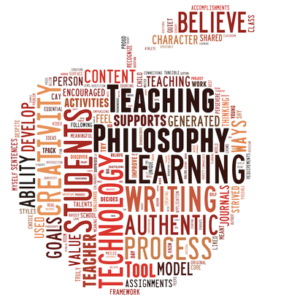 My goal is to serve learners of all styles understand, analyze and practice the theories and skills that make up journalism, research, reporting and interviewing. Ultimately, I strive to make students highly marketable in journalism/communications, and believe they will be motivated to give their best in class if they know the end result is not simply grades, but an actual career skill. I also recognize that a key focus of a liberal arts education should be to open students’ minds beyond conventional thought processes, to guide and push them toward greater understanding and explorations.
My goal is to serve learners of all styles understand, analyze and practice the theories and skills that make up journalism, research, reporting and interviewing. Ultimately, I strive to make students highly marketable in journalism/communications, and believe they will be motivated to give their best in class if they know the end result is not simply grades, but an actual career skill. I also recognize that a key focus of a liberal arts education should be to open students’ minds beyond conventional thought processes, to guide and push them toward greater understanding and explorations.
I strive to make their learning environment much like the “real” world of journalism practice, with assignments and deadlines. Our active-learning classes are a place of discovery—where mistakes are made away from the harsh real-world realities. As a professor of practice, I work constantly to keep my skills current by writing professional in news, features and sports, in work that ranges from covering sports for the Associated Press (to which I also bring students for hands-on learning), to serving on the media law and ethics committee of the Ohio Bar Association. My connections in the working world have enabled me to open many professional opportunities for students before and after graduation.
I am a great believer in the power of students to engage in and drive their own education, which means taking a greater responsibility for an engagement in what happens in your classes. To that end, we follow an “inverted” model, which means lectures are provided as short, compact videos that are watched at home BEFORE CLASS and supported with links to reading materials. Our class time is then dedicated to engaging with the material through a variety of activities and assessments to determine and build your comprehension. We also work in an “active” learning environment, which means we practice our skills on a daily basis,
This model also allows us to work more closely together, and for me to connect to each student in a more focused and direct way, to assess and understand their individual needs and goals, and to maximize what they take from the class. Their mastery of skills has been developed and showcase in live simulations conducted with the Ohio State Police Department and the Moritz College of Law, as well as through their live coverage of events across campus and Columbus for The Lantern.
My recent focus has been on peeling through the layers of the “digital native”– the idea that all students know and well use technology because they were born into a time when tech use was prevalent. In fact most students only use tech for what they think they need, and our preliminary research is finding that training in tech, much like any new “language,” is required for mastery.
To that end I have worked with Ohio State Athletics to develop a training program for student-athletes to better utilize university-provided iPads in academics. I taught more than 200 student-athletes this summer and will continue next summer to train them in a curriculum we call “Team iPad.” This work is now being sought as part of the university’s new Digital Flagship initiative with Apple, where all freshmen will receive iPads.
In 2018 I completed doctorate in Education Leadership with an emphasis on Education Technology through Lamar University. My grounded-theory dissertation examined the training of student-athletes in mobile education technology to develop a theory about how that population can best use such technology in academics.